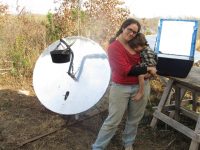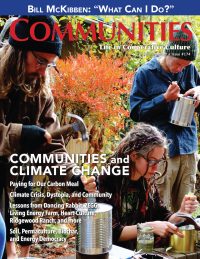Issue 174
Variations on a Theme: Low-Carbon Communities of All Sorts
Posted on May 1, 2017 by2 Comments
Three innovative non-residential groups use community as a tool to address climate change.
Affordable, Developer-Driven Ecovillages: Meeting an Unmet Need
Posted on April 21, 2017 by1 Comment
A replicable ecovillage model is our best hope for achieving essential, global-scale changes.
Soil, Communities, and Climate Change: An Interview with Nikki Silvestri
Posted on April 11, 2017 byAs a climate solutions advocate explains, carbon is not a bad thing; it’s often just in the wrong places right now.
The Question I Get Asked the Most
Posted on April 1, 2017 by“What can I do?” It’s the right question—almost.
Addressing Climate Change: Two Generations at Heart-Culture Farm Community
Posted on March 21, 2017 byFor the next generation, planting trees, growing food, and living in community are only the start.
Local Solutions to Global Warming: Paying for Our Carbon Meal
Posted on March 11, 2017 by5 Comments
Compared to carbon offsetting, carbon onsetting may be a more effective strategy to build sustainability.
Living Energy Farm: An Answer for Climate Change
Posted on March 1, 2017 byA fossil-fuel-free community empowers its members to dramatically reduce their dependence on the corporate economy.
Climate Crisis, Dystopia, and Community
Posted on February 25, 2017 byFrom the personal to the global, with hard times undeniable, community may be our life-support.
Communities and Climate Change, #174 Contents
Posted on February 20, 2017 byOur Spring issue examines how intentional communities and other groups are responding to the challenges presented by climate change. Through stories from more than a dozen diverse communities, we learn about steps being taken both to mitigate the intensity of climate disruption and to adapt to its effects. Innovative approaches include carbon onsetting, biochar production and use, personal/spiritual work, strategies for fossil-fuel-freedom, and more.




















